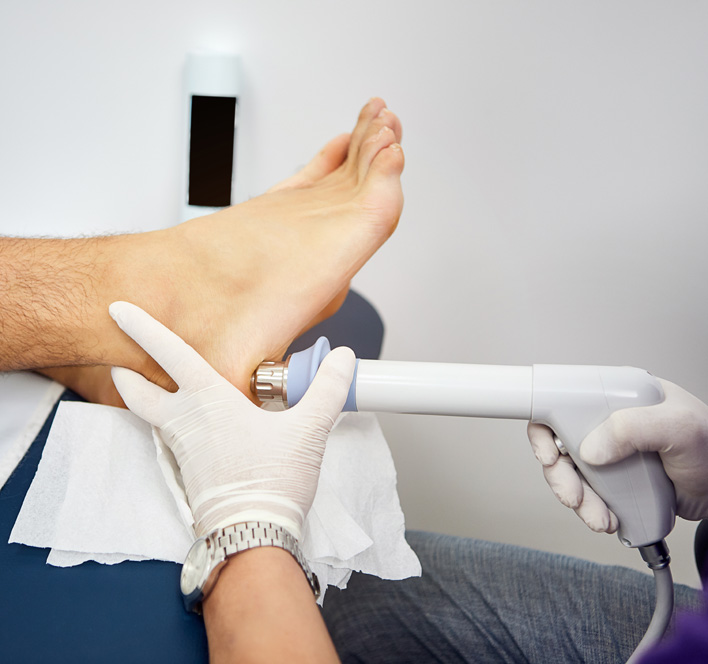When it comes to foot pain, two conditions often emerge as primary culprits: heel spurs and plantar fasciitis. At first glance, the pain from a heel spur – a small, bony growth on the heel bone – might be easily mistaken for or associated with plantar fasciitis, a condition characterized by inflammation of the plantar fascia, the thick band of tissue that runs across the bottom of your foot and connects your heel bone to your toes. Both conditions can result in significant discomfort, but their interrelation is more complex than it may appear.
NJ Spine & Orthopedic is dedicated to providing comprehensive care and innovative treatments for a variety of conditions, including those affecting the foot and ankle. Our approach to addressing heel spurs and plantar fasciitis is rooted in a deep understanding of the connection between these conditions and the overall biomechanics of the foot. By acknowledging this link, we can offer more effective and targeted treatments aimed at alleviating pain and restoring functionality.
Understanding Heel Spurs and Plantar Fasciitis
Heel spurs are often identified through diagnostic imaging, revealing a pointed, hook-like bone protruding from the heel. While they can exist without causing pain, when inflammation or injury occurs in the nearby plantar fascia, the spur can exacerbate discomfort, leading to sharper pain during activities, such as walking or running.
Plantar fasciitis, on the other hand, involves the inflammation of the plantar fascia, a key component in maintaining the arch of the foot. The stress and strain on the plantar fascia can lead to pain and stiffness, primarily felt in the heel. This condition is frequently seen in runners, overweight individuals, and those wearing shoes with inadequate support. The repetitive stress and inadequate support strain the plantar fascia, potentially leading to micro-tears at its connection point on the heel bone, where heel spurs might form as a response.
The interplay between these two conditions suggests a cycle where the presence of one can influence the development or exacerbation of the other. For instance, a heel spur may not initially cause pain but can contribute to plantar fasciitis due to the added stress on the plantar fascia. Conversely, the continuous strain from plantar fasciitis can lead to the formation of a heel spur, creating a feedback loop of discomfort and tissue damage.
Diagnosis and Treatment Options For Both Conditions
Diagnosing these conditions accurately is essential for effective treatment. At NJ Spine & Orthopedic, we utilize advanced diagnostic tools to distinguish between heel spurs and plantar fasciitis, ensuring that our patients receive the most appropriate care. This may involve physical examinations, imaging tests such as X-rays or MRIs, and an assessment of the patient’s medical history and lifestyle factors that might contribute to their condition.
Treatment strategies for heel spurs and plantar fasciitis typically begin with conservative methods, such as rest, ice, physical therapy, and anti-inflammatory medications. Orthotic devices or supportive shoes may also be recommended to alleviate pressure on the heel and plantar fascia. In cases where conservative treatments do not provide sufficient relief, more advanced options like corticosteroid injections or even surgery to remove the spur or release tension in the plantar fascia might be considered.
Preventive measures are equally important, focusing on maintaining a healthy weight, wearing proper footwear, and incorporating foot-strengthening exercises into one’s routine. These actions can help mitigate the risk of developing either condition and support overall foot health.
Why Choose NJ Spine & Orthopedic for Your Foot and Ankle Concerns?
Our comprehensive approach to treatment extends beyond immediate symptom relief. We aim to identify and address the underlying causes of your heel spur or plantar fasciitis, offering a pathway to long-term recovery and well-being. Our team of specialists is equipped with the latest technology and techniques to provide minimally invasive solutions that minimize recovery time and maximize results.
If you’re experiencing persistent foot pain and suspect it might be due to a heel spur or plantar fasciitis, do not hesitate to reach out to us. Our Concierge Team is ready to assist with scheduling and travel arrangements, ensuring that you receive the care you need without delay. For more information or to schedule an appointment, call us at (866) 553-0612 or visit our contact form. Let NJ Spine & Orthopedic help you take the first step toward pain-free living.

